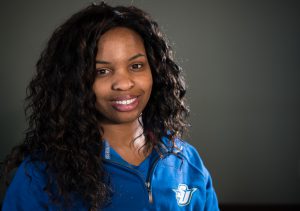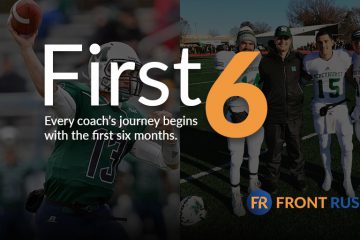Cheneta Robinson, Head Volleyball Coach at Spalding University
Front Rush is excited to share stories from coaches across all divisions and sports. Every coach’s journey begins with the first six months.

Why did you start coaching?
I started coaching immediately after my collegiate career was over. I’m not sure it was my intention to become a collegiate coach. Once my senior season was over I realized I wanted volleyball to stay a part of my life and club volleyball was an opportunity available to me. I started working with a small club in South Indianapolis and slowly began making my way to the current position I am in now.
Describe the transition from assistant to head coach. What have you learned in your first season as head volleyball coach?
The transition was really quick. I think being an assistant coach has both prepared and limited me in some ways. As an assistant I was able to do a lot of behind-the-scenes work, travel itineraries, scheduling, some budget, and gear inventory. Areas like those I was able to make a pretty smooth transition, however areas like practice planning I had to rely on what I learned from when I was a head coach for different clubs. I also have to develop my own recruiting strategy, as an assistant I was always trying to find the athlete that fit someone else’s idea of what they were looking for. Now I have my own agenda and can search for athletes I am sure about.
In the beginning of your coaching career, what was the most challenging part of your job?
When I first started coaching I was 22 and I was coaching 18 year olds, so the most challenging part then was explaining that we aren’t friends although we were close in age and you should listen to me because XYZ. The most challenging part of coming into a program like I did as an assistant coach and head coach is that the program has already been established. I was technically the new person and I had to build new relationships before I could be any type of enforcer. I truly believe getting to know who you are coaching is essential to building a good team, not too many players are going to play for someone they do not like.
What has been your biggest accomplishment as a coach?
My biggest accomplishments are whenever I can instill some type of life lesson to my athletes or when they want to become coaches. I recently went to a tournament with my team and across the net was one of my very first players that I coached I was excited to see that because that tells me that she still loves the sport. You hear so many stories about some coaches driving players away from the sport, so it’s just very rewarding when you can be a coach that bring players closer to it.
Do you have specific advice for coaches just starting out?
Keep God first. This can be a very stressful career choice at times, but just remember there is a bigger picture.
Stay true to who you are as a person. I think some coaches think you have to be one way on the court and that is different than who they really are. If you aren’t a yeller, don’t try to make yourself into a yeller. If you like to stand and be animated during matches do that, be yourself and your players will respond.
Don’t be afraid to fail. I have put together many drills and on paper they look great, then the team does it and I realize it’s not so great. Failing is a part of getting better for athletes and coaches.
Know your true goal. Every coach wants to win, but when you aren’t winning are you still trying to accomplish something? During our losing streak is when I realized my real goal is not about conference, my real goal is to teach my athletes life lessons that they will be able to use long after they leave my program.
Have fun. Sounds cliché, however if you’re coaching it is more than likely because you love it, so have fun doing what you love.




